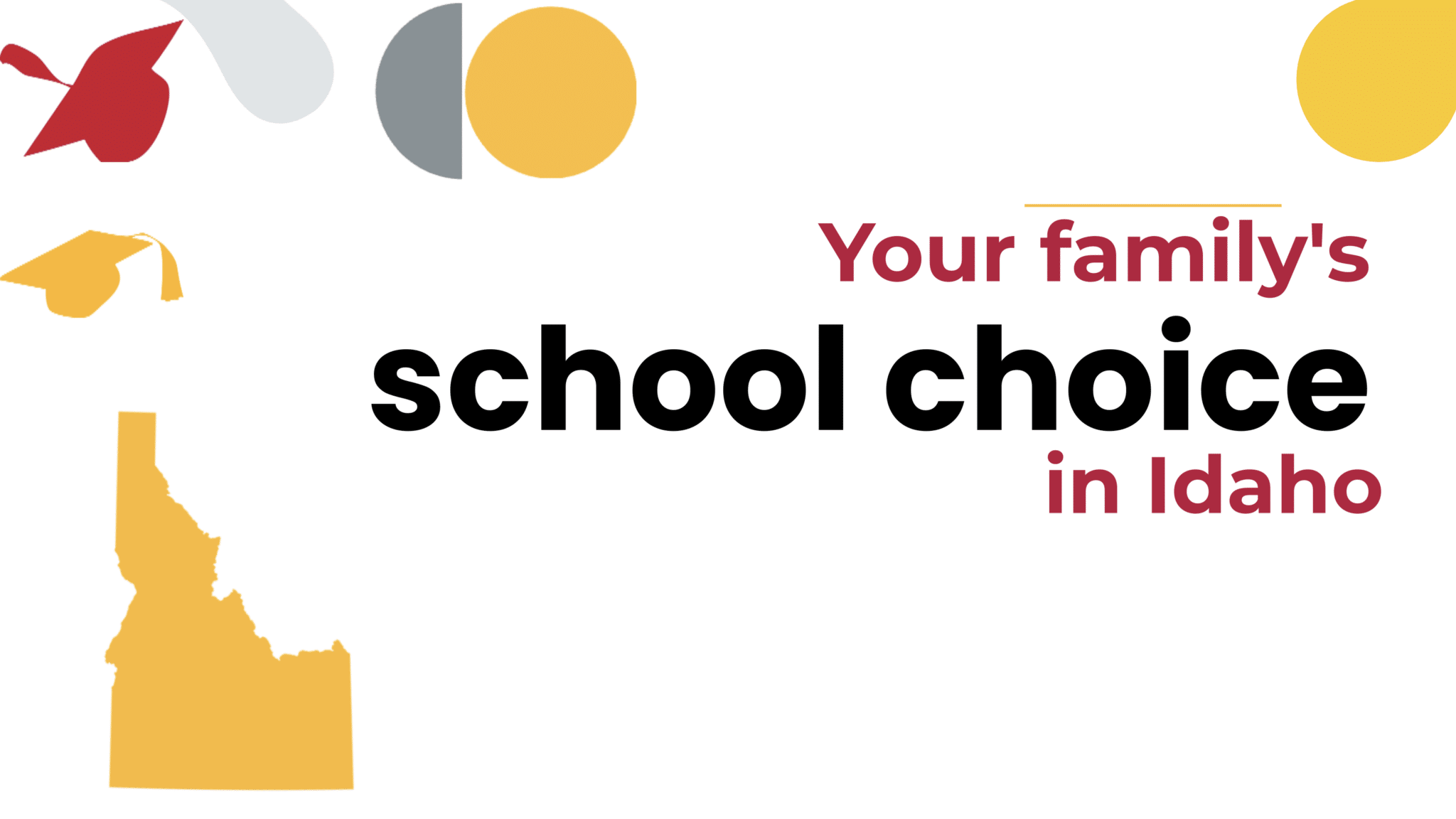Choosing a school? You’ve got options.
If you live in Idaho, you have access to more K-12 education options for your child than you might realize. Navigating these options can help you find a school where your child thrives, but it can also feel overwhelming at first. This post will breakdown the main types of schools available to you and provide some extra resources too!
In short, you can choose from traditional public schools, public charter schools, public magnet schools, private schools, online learning, homeschooling, and microschooling and mix-and-match learning.
Looking for special education options? You can learn what special education services are available in Idaho at the Ultimate Guide to Special Education.
*Note: For the 2023-2024 school year, low-income Idaho students in any type of school or grade may be eligible for funding to put toward tutoring or other educational expenses through the Empowering Parents Program.*

- Traditional Public Schools
- Public Charter Schools
- Public Magnet Schools
- Private Schools
- Online Schools
- Homeschool
- Microschooling
Idaho Traditional Public Schools
Most children in Idaho (and in America) attend traditional public schools. Traditional public schools are free to attend, open to all students, operated by school districts, and funded by taxpayers like you. Did you know that Idaho spends an average of $9,053 per public school pupil each year? You can search your school’s spending and that of nearby schools at Project Nickel.
As of 2024, about 77.1% of Idaho students choose traditional public schools. Idaho has unrestricted open enrollment for public school. What this means is that you can likely send your child to any public school in Idaho regardless of where you live or where the school is located. You can take advantage of this valuable option by visiting multiple public schools near you and discovering which is the best fit for your family. Traditional public schools aren’t all the same: They may differ in learning methods and one may just “feel different” than another to you.
A law passed in 2023 updates Idaho’s enrollment law and makes a few changes. For example, while transfer students previously had to reapply annually, the new law doesn’t require families to reapply after two years at a public school of their choice.
For a real-world example of the open enrollment transfer process, check out Boise School District’s application guidelines. Just keep in mind that parents are usually responsible for transportation of students participating in open enrollment.
Additionally, through the state’s Advanced Opportunities program, every public school student in Idaho is allocated $4,125 to use in grades 7-12. These funds can be used for dual credits, Advanced Placement Exam fees, professional certifications, workforce training, or other qualified expenses.
Find out more about public schools in your state at the Idaho Department of Education.
Idaho Charter Schools
You have another public, tuition-free option in charter schools! As of 2023, about 8.4% of Idaho students choose charters. Like traditional public schools, charter schools are public, free, and usually have no requirements for entry. What distinguishes charter schools is that they are allowed extra freedom to innovate with curriculum and learning methods. Public charter schools are held accountable to authorizing entities, such as colleges or school districts, for results.
Idaho passed charter school legislation in 1996. Today, Idaho has more than 50 brick-and-mortar charter schools, as well as several virtual charter schools, that parents can choose from. You can find a complete list at the Idaho Department of Education. Each school has a charter which explains the school’s purpose and what specific community need it serves, whether that be providing a language immersion program or offering a rigorous, literacy-based curriculum. For example, one of the state’s newest charters, Elevate Academy Idaho Falls, offers career technical education for at-risk students.
If there are more families seeking admittance to a charter school than there are seats, a lottery system is usually used to determine admittance.
As public school students, charter students have access to the state’s Advanced Opportunities program too.
Learn more about Idaho’s charter schools from the Idaho Charter School Network. You may also wish to check out the Coalition of Idaho Charter School Families.
Idaho Magnet Schools
Magnet schools are another school choice in Idaho. Magnet schools are free public schools that allow kids to narrow in on a specific learning track, such as engineering or the performing arts. At a magnet school, all the subjects are taught through the lenses of that specific track.
Idaho has more than 20 magnet schools or schools with magnet programs serving 3.1% of the K-12 student population. Idaho’s magnet program locations include Boise, Meridian, Eagle, Hailey, Idaho Falls, Nampa, Ammon, and Coeur d’Alene. As public school students, magnet students have access to the state’s Advanced Opportunities program, just like students at traditional neighborhood schools.
Idaho Private Schools
Families in Idaho can also consider private schools, nonpublic schools that charge tuition. Private schools may offer a unique curriculum, smaller class sizes, or a faith-based tradition. Idaho’s private schools come in all shapes and forms, from religious schools to schools designed for children with special needs.
There are more than 150 private schools across the state of Idaho serving 5.4% of the K-12 student population. The average tuition for private schools in the state is $8,309 for elementary schools and $7,981 for high schools. Unfortunately, there are no state-run scholarship options in Idaho at present to help with the cost of private school, but private scholarships may be available. Also, the federal government allows parents to save for K-12 private school tuition using tax-preferred 529 savings accounts.
Learn more at the Catholic Diocese of Boise School Directory and Private School Review: Idaho.
Idaho Online Learning
Idaho offers several full-time, free online learning options for students statewide in grades K-12, like Inspire Connections Academy, Idaho Virtual Academy, and the college-prep-focused Gem Prep Online.
Students in grades 6-12 can also consider Idaho Connects Online School, while students in grades 7-12 can consider iSucceed Virtual School or Bonneville Online High School. Students in grades K-8 can consider Idaho Home Learning Academy. Students in grades 9-12 can consider Idaho Technical Career Academy, a full-time online school focused on career readiness. Meanwhile, Kootenai Bridge Academy is an alternative online option for students ages 16-21 seeking to finish high school.
For part-time options, Idaho students may enroll in online classes through the state virtual school, Idaho Digital Learning Alliance. Idaho Digital Learning Alliance is available to students in any type of educational setting, public or private. But, parents should check with their local public school or district for details, as fees may apply.
Additionally, more than 10 Idaho school districts have established online school programs. For example, students in the Boise School District, or students with an approved open enrollment status from another district, can choose the Boise Online School.
To read more about online learning in Idaho, check out the Digital Learning Collaborative’s state profile.
Idaho Homeschooling
Families in Idaho and all 50 states can choose homeschooling! Homeschooling is the process of parents educating students at home and allows for highly customized education. In Idaho, 6% of all K-12 students are homeschooled. The state does not require you to submit notice of your intent to homeschool. However, you may wish to formally withdraw from your current school so that your student is not marked truant.
If you choose to homeschool, you are required to teach subjects commonly taught in Idaho public schools, but specific standardized tests are not required. Keep in mind that your homeschooled child may be eligible to take classes at the local public school, or participate in sports, through the state’s dual enrollment programs.
Idaho may have funding assistance available if you homeschool through a public school program. The Home School Legal Defense Association has a great how-to about homeschooling in Idaho. You may also want to check out Homeschool Idaho or the North Idaho Home Educator’s Association.
Idaho Microschools and Mix-and-Match Learning
Today, many Idaho families are blending school options to come up with new ways to personalize education. Microschools are one of these ways. A microschool refers to students gathering together in a small group – with adult supervision – to learn, explore, and socialize. Microschools can take a variety of shapes and legal forms, from homeschoolers coming together at an enrichment center to a private school committed to small classrooms. What microschools share in common is a commitment to small-group learning and close-knit relationships, along with an emphasis on children as individual learners.
Here are just a few examples of Idaho microschools and related resources:
One Idaho online school, Gem Prep Online, is starting pods called “learning societies” for interested families. While using the online school’s curriculum, small groups of students will work in the same space, whether that’s a church, home, or other building.
Heroes Academy is an Acton Academy-style private microschool in Treasure Valley. Another Acton microschool is located in Acton Academy: Idaho Falls.
Low-income Idaho families can apply to the Empowering Parents Grant Program to receive funding for learning materials and services for their K-12 student. The program is open to homeschool and private school students as well as public school students.
Idaho has passed a bill that allows groups of parents to partner with their school district on “innovation classrooms,” like microschools within the public school setting. Similar to pods, these “innovation classrooms” could be small learning groups where kids use an alternative curriculum and are taught by a specific teacher.
Remember, microschooling is more a mentality than a specific legal distinction in most cases. Often, a family participates in a microschool while legally homeschooling, or being enrolled in a private or online school.
Search for Schools Near Me
Microschooling and Mix-and-Match Learning
How can it empower parents and help kids achieve their dreams?
7 Step Guide
Tips to help you find a school where your daughter or son will learn, succeed, and be happy.
Education Resources for
Idaho Parents
For additional information about school choices in Idaho, visit these resources:
Every state is different when it comes to school choice options.
Sign up below to get a detailed comparison:
"*" indicates required fields
